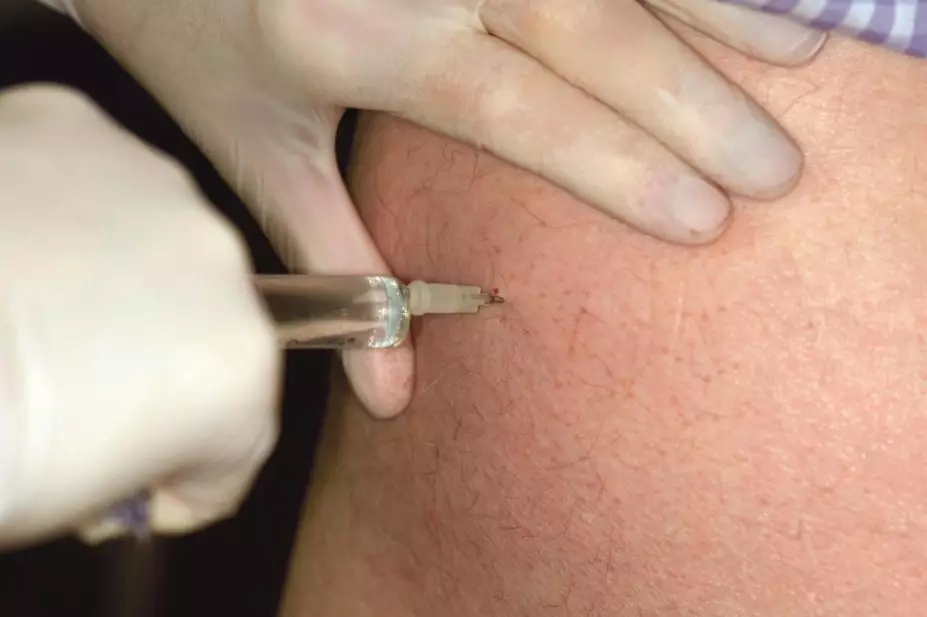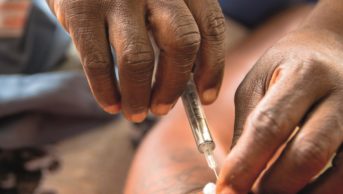
Dr P Marazzi / Science Photo Library
A study has shown that a contraceptive injection that suppresses spermatogenesis in around 96% of men is effective at preventing pregnancy, but the trial was halted early owing to side effects, including mood disorders and increased libido.
In the multicentre trial, reported in the Journal of Clinical Endocrinology and Metabolism
[1]
(online, 27 October 2016), researchers tested the safety and effectiveness of an intramuscular injection of 200mg norethisterone enanthate — a long-acting progestogen — combined with 1,000mg testosterone undecanoate — a long-acting androgen — in 320 healthy men aged 18–45 years.
“Despite the various adverse events and clinically intensive study regimen, male participants and their partners found this combination to be highly acceptable,” say the researchers. “More than 75% reported being… willing to use this method if available, which supports further development of this approach.”
Study participants were all in monogamous relationships with female partners with whom they had sex on average twice a week. They received the injection intramuscularly every 8 weeks, and gave semen samples after 8 and 12 weeks, and then every 2 weeks until their sperm count was lowered to less than 1 million/ml (the threshold considered necessary for contraception). During this suppression phase, the men and their partners were instructed to use other non-hormonal birth control methods. Once the sperm count had lowered, 266 of these men continued to receive injections every 8 weeks for up to 56 weeks, and continued to provide semen samples every 8 weeks to ensure their sperm counts stayed low.
The injection was effective in reducing the sperm count of 274 of the men to 1 million/ml or less within 24 weeks (95.9% of continuing users; 95% confidence interval [CI] 92.8– 97.9). Four pregnancies occurred among the partners of the 266 male participants who continued to receive the injection (pregnancy rate 1.57%; 95% CI 0.59–4.14). After the injections were stopped, the men’s semen was analysed every 4 weeks until sperm numbers returned to the normal range (15 million/ml or 39 million per ejaculate). After 52 weeks, 94.8% (95% CI 91.5–97.1) had a sperm count within normal range.
During the course of the trial, 1,491 adverse events were reported, but 38.8% of these were said to be unrelated to the injection. The most common adverse events reported were acne, injection site pain, increased libido and mood disorders. The most serious adverse events considered probably related to the treatment included one case of depression; one case of intentional paracetamol overdose; and one case of an abnormally fast and irregular heartbeat on cessation of the injections.
However, the researchers say that adjustments to the injection’s hormonal balance will reduce the frequency and severity of side effects.
Allan Pacey, professor of andrology at the University of Sheffield, who was not involved in the study, says there is an unmet need for an effective reversible contraceptive for men, along the lines of the hormonal contraceptive for women. “None of the preparations that have been developed and tested to date have managed to become a commercial reality for one reason or another,” he says. “This contraceptive was extremely effective and therefore certainly has promise. However, the fact that so many side effects were observed in the men who were taking part in the trial is of concern. For a male contraceptive to be accepted by men (or women) then it has to be well tolerated and not cause further problems.”
Also commenting on the study, Allan Young, professor in mood disorders at the Institute of Psychiatry, Psychology and Neuroscience (IoPPN) at King’s College London, says: “The adverse effects on mood of an injectable combination hormonal contraceptive reminds us that men, as well as women, may be subject to effects of reproductive hormones on mood. Mood disorders are serious neuropsychiatric conditions and should be carefully considered when reviewing the risk/benefit ratio of any treatment in this area.”
The trial was conducted at ten sites: two sites in Australia, Germany and the UK, and one site in Chile, India, Indonesia and Italy.
References
[1] Behre HM, Zitzmann M, Anderson RA et al. Efficacy and safety of an injectable combination hormonal contraceptive for men. Journal of Clinical Endocrinology and Metabolism 2016. doi: 10.1210/jc.2016-2141


